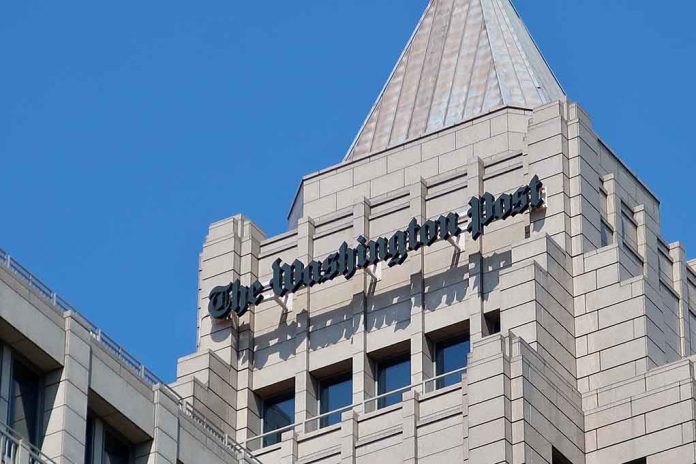
Following The Washington Post’s choice not to endorse a 2024 candidate, there has reportedly been a startling drop of 200,000 subscribers, igniting questions about the repercussions of this decision.
At a Glance
- Washington Post and Los Angeles Times are reportedly seeing mass cancellations.
- Jeff Bezos defended WaPo’s non-endorsement.
- Resignations and internal turmoil at the Post have unfolded in the wake of the decision.
- Critics decry the non-endorsement as a failure to oppose Trump.
Subscriber Backlash
Recent reports indicate that following The Washington Post’s decision to refrain from endorsing a presidential candidate, over 200,000 digital subscriptions, approximately 8% of the Post’s paid circulation, have been canceled. The decision aimed to prevent perceived bias and restore public trust, as stated by Jeff Bezos, owner of the Post. However, the non-endorsement has been followed by multiple resignations and public dissent from readers and journalists alike.
The Los Angeles Times also reportedly faced over 7,000 cancellations attributed to “editorial reasons” following its own decision not to endorse anyone. Critics perceive the non-endorsement as neglecting the newspaper’s duty to its audience, while others view it as an opportunity to neutralize political polarization. Former Post editor Martin Baron voiced disapproval, highlighting the impact this could have on faithful subscribers who trusted the Post to challenge figures like Donald Trump.
The Washington Post has reportedly lost more than 200,000 subscribers following a decision announced last week not to endorse a candidate in the presidential race. https://t.co/LQ6NwMNTeC
— The Seattle Times (@seattletimes) October 29, 2024
Internal Response and Challenges
The decision not to endorse has sparked internal conflict within the Washington Post, resulting in resignations among columnists and editorial board members. This internal upheaval demonstrates the complex dynamics between editorial independence and business interests.
“This is a self-inflicted wound on the part of the Washington Post. Many of these readers signed up for the Post because they believed it would stand up to Donald Trump. And now they fear this is a sign of weakness … and an invitation to Trump to continue to bully the owner of the Washington Post,” Baron said in an interview.
Robert Kagan, WaPo’s editor-at-large, resigned from his position following the non-endorsement, alleging a quid pro quo between Trump and Bezos. “All Trump has to do is threaten the corporate chiefs who run these organizations with real financial loss, and they will bend the knee,” Kagan said.
Jeff Bezos has defended the decision emphasizing that there is no “quid pro quo” involved and aims to curb perceptions of bias to maintain the newspaper’s integrity. The non-endorsement decision, announced not long before the election, is criticized for its timing, with Jeff Bezos acknowledging the announcement could have been made earlier to avoid public dissatisfaction.
Impact and Broader Implications
The decision to not endorse highlights the increasing trend among media outlets to reconsider their historical roles in political endorsements amid rising polarization. Some newspapers, like the Oregonian and Cleveland’s Plain Dealer, continue endorsing candidates to adhere to reader expectations. The withdrawal from endorsements by the Washington Post, despite its reputation as a critic of Trump, underscores the broader debate on journalism’s place in political discussions.
“Our democracy is very much under threat, and we should be bolstering our institutions as an act of defiance against the threat of authoritarianism, Choosing to sit this one out is shortchanging our community at the time when we need the institution most.” Miguel Santana, California Community Foundation CEO, said.
This decision also sheds light on the financial struggles of traditional media outlets, emphasizing the delicate balance they must maintain between business operations and editorial integrity in an increasingly divided political landscape.
Sources
- Over 200,000 subscribers flee ‘Washington Post’ after Bezos blocks Harris endorsement
- L.A. Times, Washington Post see subscription cancellations over not endorsing in presidential race
- Ex-WaPo editor claims Jeff Bezos colluded with Trump to kill Harris endorsement: ‘Quid-pro-quo’
- Newspaper non-endorsements at Washington Post, LA Times fit a trend, but their readers aren’t happy














